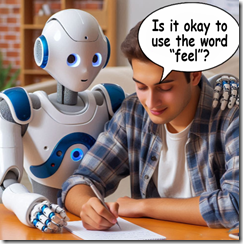Google and Its Smart Software: The Emotion Directed Use Case
July 31, 2024
 This essay is the work of a dumb humanoid. No smart software required.
This essay is the work of a dumb humanoid. No smart software required.
How different are the Googlers from those smack in the middle of a normal curve? Some evidence is provided to answer this question in the Ars Technica article “Outsourcing Emotion: The Horror of Google’s “Dear Sydney” AI Ad.” I did not see the advertisement. The volume of messages flooding through my channels each days has allowed me to develop what I call “ad blindness.” I don’t notice them; I don’t watch them; and I don’t care about the crazy content presentation which I struggle to understand.
A young person has to write a sympathy card. The smart software is encouraging to use the word “feel.” This is a word foreign to the individual who wants to work for big tech someday. Thanks, MSFT Copilot. Do you have your hands full with security issues today?
Ars Technica watches TV and the Olympics. The write up reports:
In it, a proud father seeks help writing a letter on behalf of his daughter, who is an aspiring runner and superfan of world-record-holding hurdler Sydney McLaughlin-Levrone. “I’m pretty good with words, but this has to be just right,” the father intones before asking Gemini to “Help my daughter write a letter telling Sydney how inspiring she is…” Gemini dutifully responds with a draft letter in which the LLM tells the runner, on behalf of the daughter, that she wants to be “just like you.”
What’s going on? The father wants to write something personal to his progeny. A Hallmark card may never be delivered from the US to France. The solution is an emessage. That makes sense. Essential services like delivering snail mail are like most major systems not working particularly well.
Ars Technica points out:
But I think the most offensive thing about the ad is what it implies about the kinds of human tasks Google sees AI replacing. Rather than using LLMs to automate tedious busywork or difficult research questions, “Dear Sydney” presents a world where Gemini can help us offload a heartwarming shared moment of connection with our children.
I find the article’s negative reaction to a Mad Ave-type of message play somewhat insensitive. Let’s look at this use of smart software from the point of view of a person who is at the right hand tail end of the normal distribution. The factors in this curve are compensation, cleverness as measured in a Google interview, and intelligence as determined by either what school a person attended, achievements when a person was in his or her teens, or solving one of the Courant Institute of Mathematical Sciences brain teasers. (These are shared at cocktail parties or over coffee. If you can’t answer, you pay the bill and never get invited back.)
Let’s run down the use of AI from this hypothetical right of loser viewpoint:
- What’s with this assumption that a Google-type person has experience with human interaction. Why not send a text even though your co-worker is at the next desk? Why waste time and brain cycles trying to emulate a Hallmark greeting card contractor’s phraseology. The use of AI is simply logical.
- Why criticize an alleged Googler or Googler-by-the-gig for using the company’s outstanding, quantumly supreme AI system? This outfit spends millions on running AI tests which allow the firm’s smart software to perform in an optimal manner in the messaging department. This is “eating the dog food one has prepared.” Think of it as quality testing.
- The AI system, running in the Google Cloud on Google technology is faster than even a quantumly supreme Googler when it comes to generating feel-good platitudes. The technology works well. Evaluate this message in terms of the effectiveness of the messaging generated by Google leadership with regard to the Dr. Timnit Gebru matter. Upper quartile of performance which is far beyond the dead center of the bell curve humanoids.
My view is that there is one positive from this use of smart software to message a partially-developed and not completely educated younger person. The Sundar & Prabhakar Comedy Act has been recycling jokes and bits for months. Some find them repetitive. I do not. I am fascinated by the recycling. The S&P Show has its fans just as Jack Benny does decades after his demise. But others want new material.
By golly, I think the Google ad showing Google’s smart software generating a parental note is a hoot and a great demo. Plus look at the PR the spot has generated.
What’s not to like? Not much if you are Googley. If you are not Googley, sorry. There’s not much that can be done except shove ads at you whenever you encounter a Google product or service. The ad illustrates the mental orientation of Google. Learn to love it. Nothing is going to alter the trajectory of the Google for the foreseeable future. Why not use Google’s smart software to write a sympathy note to a friend when his or her parent dies? Why not use Google to write a note to the dean of a college arguing that your child should be admitted? Why not let Google think for you? At least that decision would be intentional.
Stephen E Arnold, July 31, 2024
How
How
How
How
How



